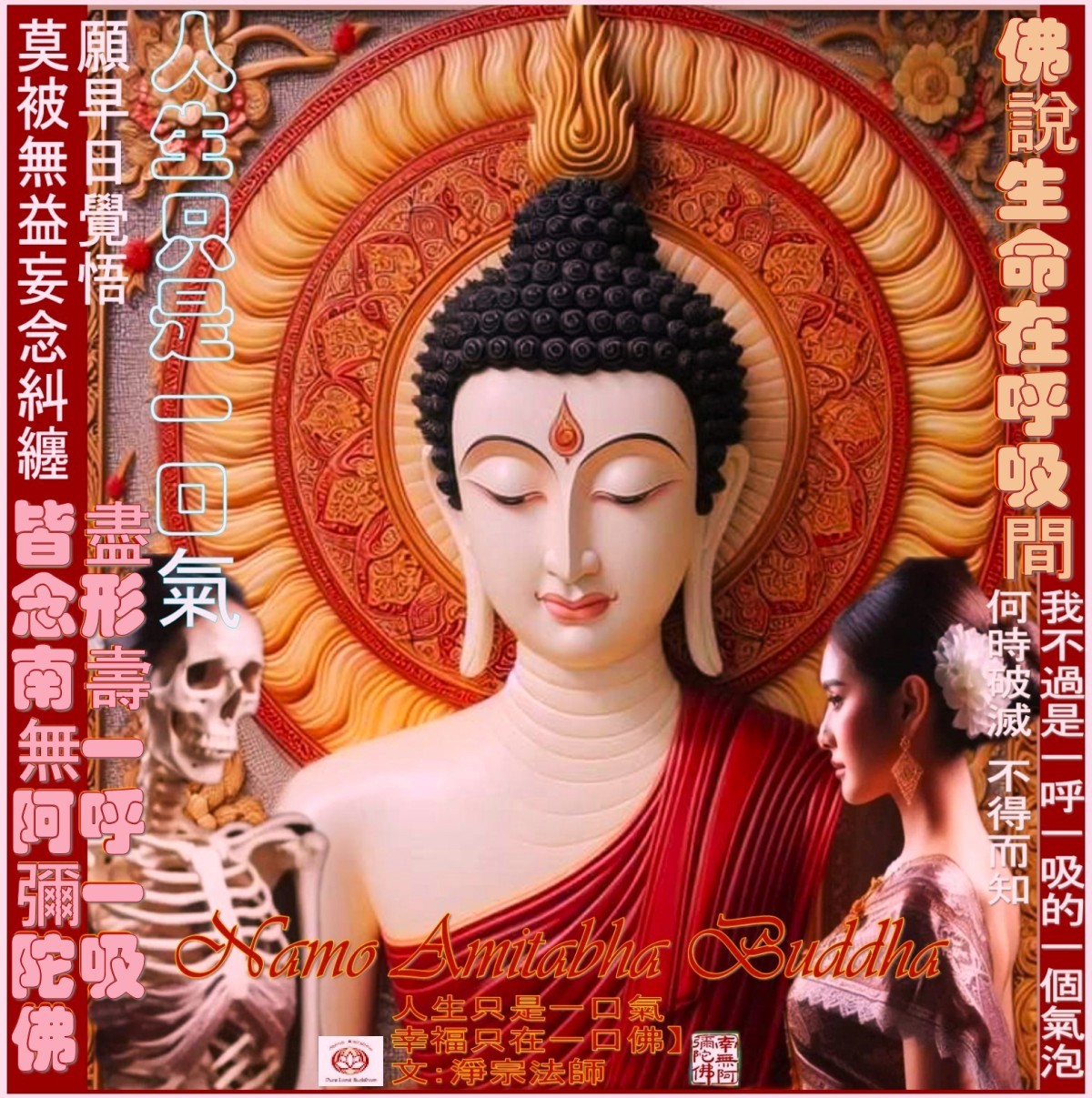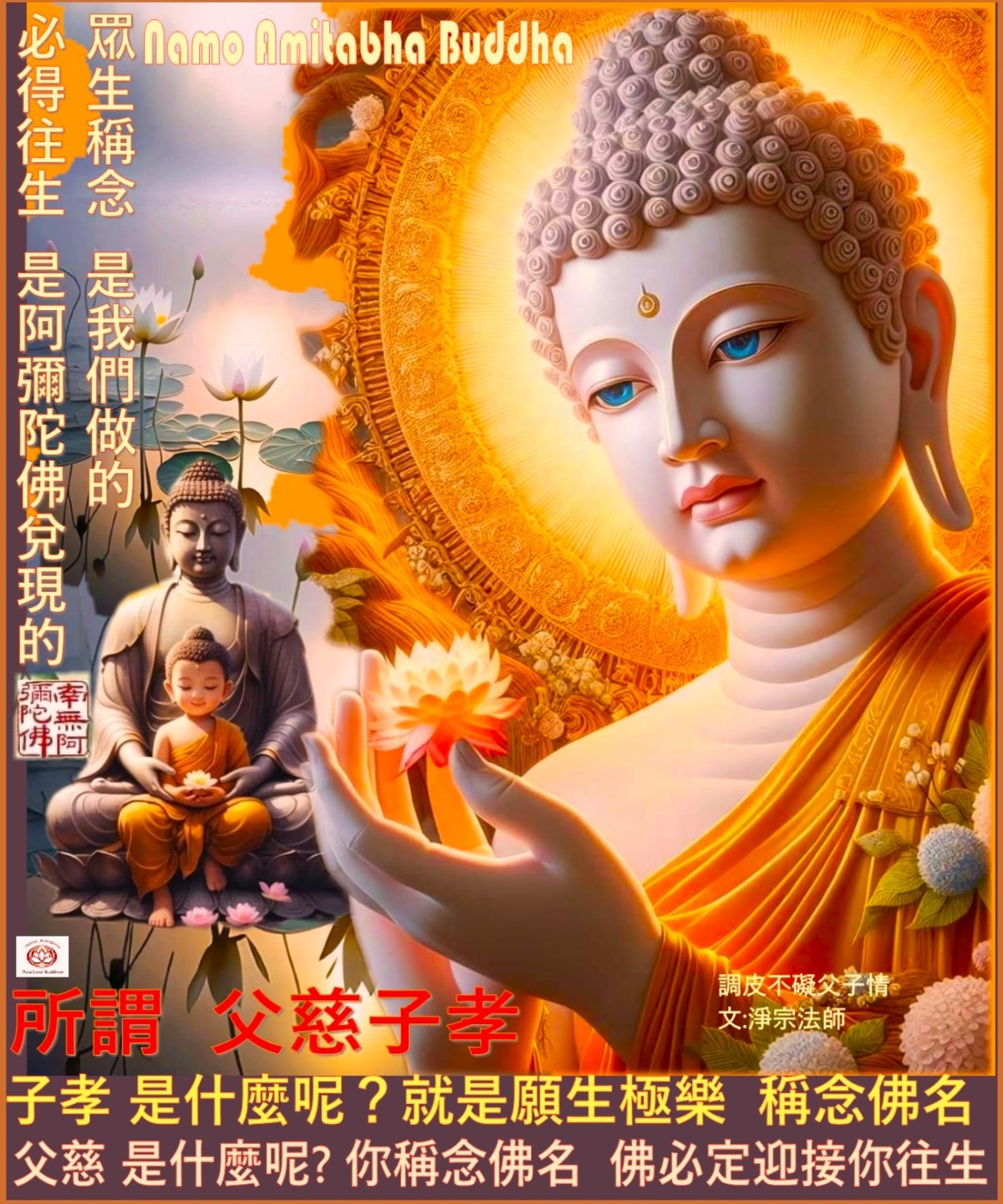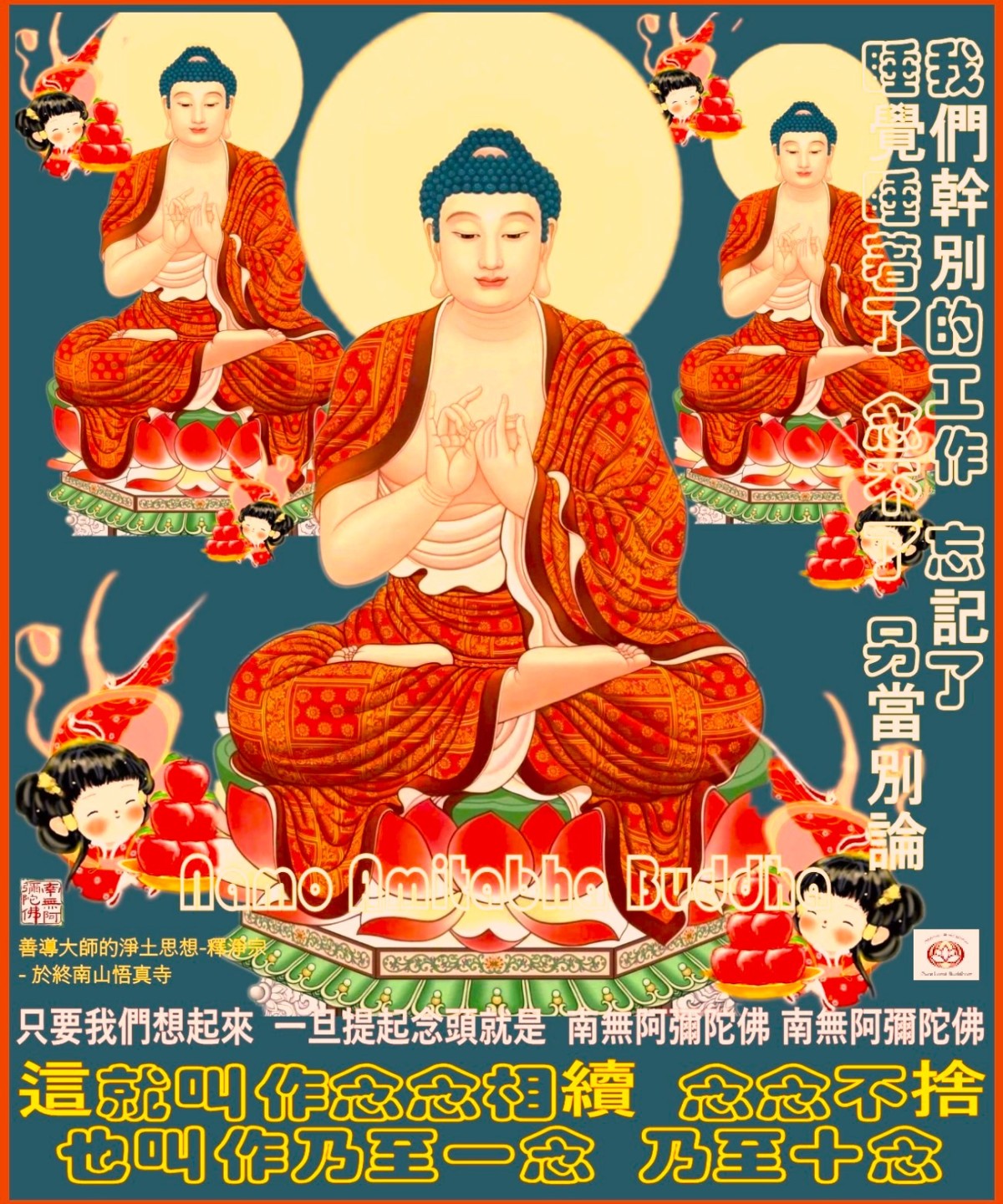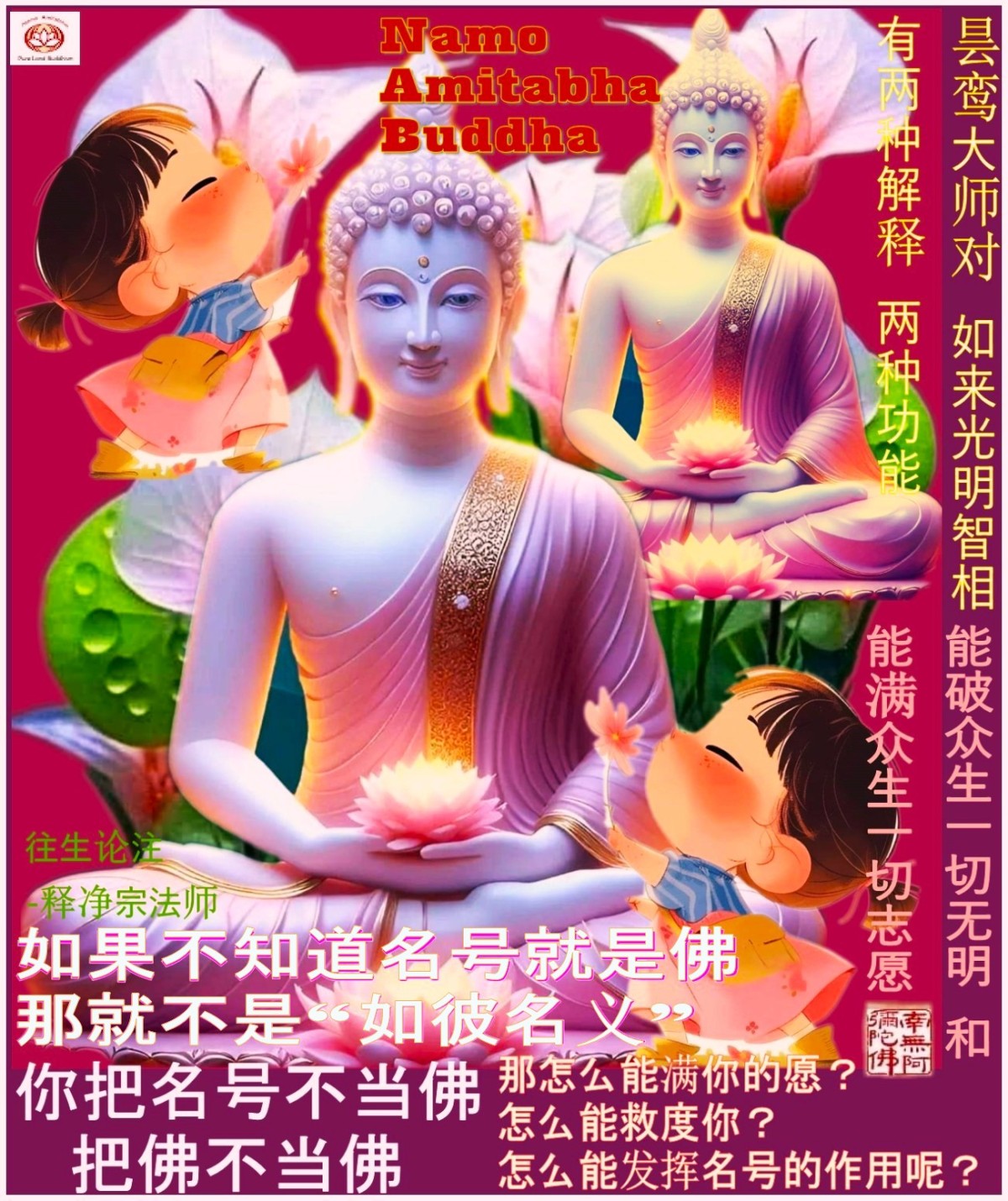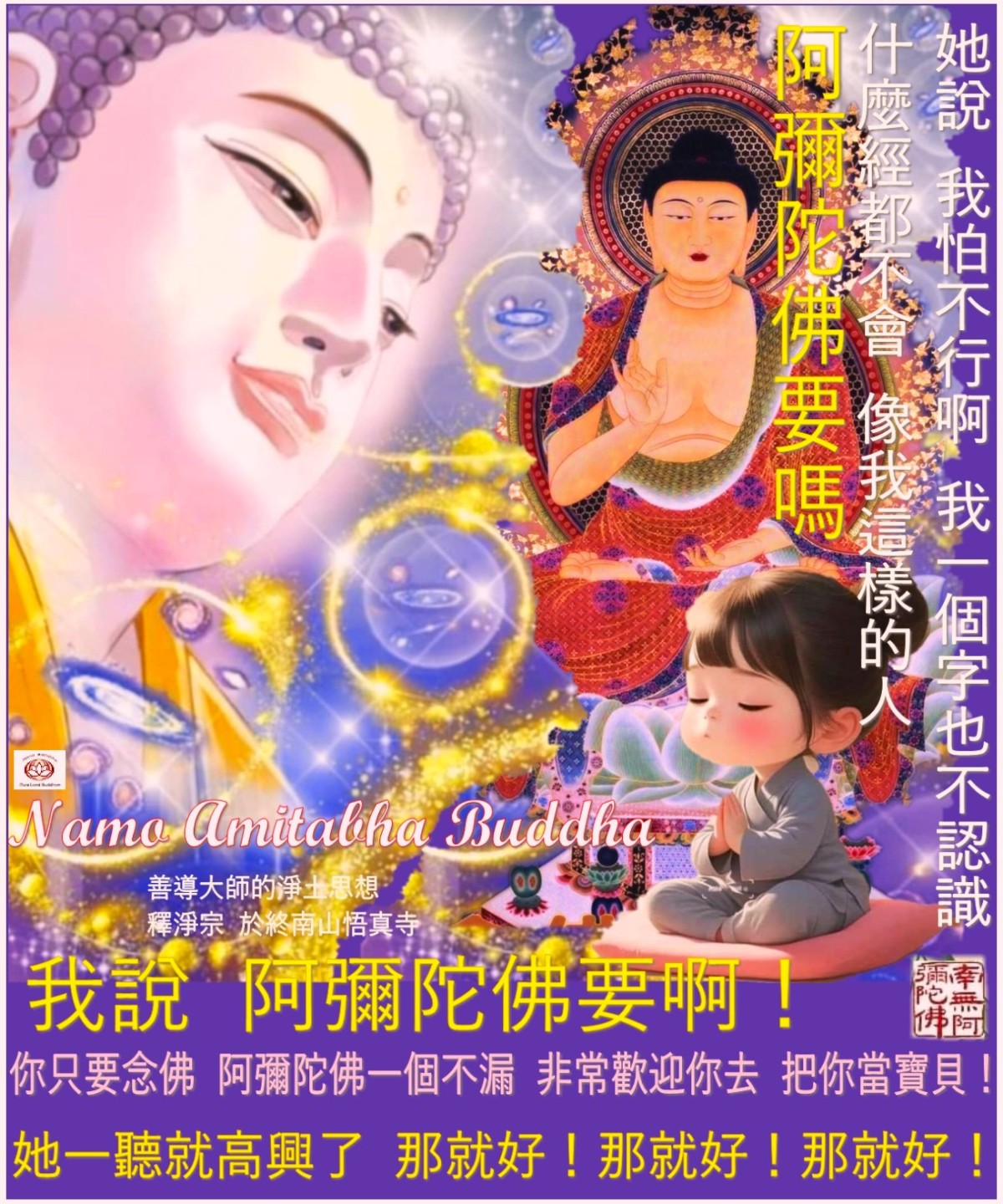By Dharma Master Shi Jing Zong at Wu Zhen Monastery at Zhong Nan Shan
善導大師的淨土思想-釋淨宗 – 於終南山悟真寺
第十一章 不問時節 稱名必生
Chapter 11 Without considering the timespan in practice. By reciting the Buddha’s Name an attainment of a rebirth is confirmed.
1 The timespan in Amitabha recitation
‘The timespan’ refers to the length of time spend on Amitabha recitation which may either be long or short. Amitabha Buddha does not bother whether your timespan in Amitabha recitation is long or short. As long as you recite Namo Amitabha Buddha, you will surely attain a rebirth in the Western Pure Land. The World of Ultimate Bliss is the most supreme. Many people desire to attain a rebirth. But after further thinking, they say, ‘I have not taken refuge in the Buddha yet. Anyway, my recitation of Namo Amitabha Buddha is quite short. Do you think people like me can attain a rebirth?’
To break down this doubt, Great Master Shandao told us, ‘Reciting Namo Amitabha Buddha to attain a rebirth does not depend on your timespan in practice which is either long or short. It does not depend on you who may be a long-time practitioner or a beginner.
第十一章 不問時節 稱名必生
一、念佛時節
「時節」,就是念佛時間的長短。阿彌陀佛不管你念佛時間是長是短,只要你稱念南無阿彌陀佛,必然往生西方淨土。
極樂世界這麼殊勝,這麼好,很多人心裡還是想往生,但是想來想去,說:「我到現在還沒歸依,念佛時間也不長,像我這樣也能往生嗎?」
為了破除這樣的疑惑,善導大師就告訴我們:念佛往生,不在時節長短,不在你是久修還是新學。
Below, there are three passages which I would like to explain.
2.The timespan is not considered.
(a) In the Primal Teaching of the Contemplation Sutra, there is the passage on the ‘timespan in Amitabha recitation.’
We should recite Namo Amitabha Buddha throughout our life or as little as one day, one hour, one recitation and so on. Or we should recite Namo Amitabha Buddha from a single recitation, ten recitations, until one hour, one day or throughout one’s life.
下面有三條文,我來說明一下。
二、不問時節
(一)《觀經疏》「念佛時節之文」
上盡一形,下至一日、一時、一念等;
或從一念、十念,至一時、一日、一形。
Briefly, it means that from the time we have brought forth the mind to attain a rebirth, we will not retreat from Amitabha recitation throughout our life. We only aim to be born in the Pure Land.
大意者:
一發心以後,誓畢此生,無有退轉,唯以淨土為期。
This is the explanation given by Great Master Shandao in the Primal Teaching of the Contemplation Sutra concerning the timespan in Amitabha recitation. Here the explanation is given in three parts.
1 From more to less: A man recites Namo Amitabha Buddha throughout his life or as little as one day, one hour, one recitation.
2 From less to more: A man recites Namo Amitabha Buddha from as little as one recitation. He continues to recite for ten times, for one hour, one day and even throughout his whole life.
3 ‘Briefly, it means’ refer to the root principles, the guidelines: Once we have brought forth the mind to recite Namo Amitabha Buddha, vowing to be born in the Western World of Ultimate Bliss, we will spend our whole life in Amitabha recitation, without changing, without retreating, until our attainment of a rebirth.
這是善導大師在《觀經疏》中說念佛時節,用三段話來說明。
第一段,從多向少:上從一輩子念佛,下到一天、一個時辰,最少一念的念佛。
第二段,從少向多:從最少一念開始,延續至十念,再到一時、一日,直到一輩子。
第三段,「大意」就是根本原則、要領:從發心念佛、願生西方極樂世界起,一輩子念佛,不改變,不退轉,直到往生。
This is because the time for a man to encounter the Pure Land Dharma Door is not the same. Some have met it earlier while others later. The length of one’s lifespan may either be long or short. So, there is the explanation on the recitation from a little until a lot, or the recitation from a lot to a little.
因為每個人遇到淨土法門的時間各有早晚,每個人的壽命也各有長短,所以有從少向多、從多到少的說明。
(b) In the Primal teaching of the Contemplation Sutra, there is a passage on ‘the Karma of Right concentration.’
Single-mindedly we recite Namo Amitabha Buddha exclusively while we are walking, standing, sitting or lying down. If we can recite continually without abandoning, without considering the timespan of practice which may either be long or short, this is known as the karma of Right Concentration as we are acting in accord with the Buddha’s Vows.
(二)《觀經疏》「正定業之文」
一心專念彌陀名號,
行住坐臥,不問時節久近,念念不捨者,
是名正定之業,
順彼佛願故。
As long as we can recite Namo Amitabha Buddha continually, without abandoning the practice, this is the karma of right concentration. Our attainment of a rebirth does not rely on the long or short timespan in Amitabha recitation. So, this is the meaning of ‘without considering the timespan of practice which may either be long or short.’ Amitabha Buddha will not ask this question, ‘So you want to go to the World of Ultimate Bliss, aren’t you? How long have you been practicing Amitabha recitation?’ Even if you can recite Namo Amitabha Buddha once and pass away, Amitabha Buddha will instantly come and welcome you to be born in the Western World of Ultimate Bliss. This is just as mentioned in the three rebirths of the inferior grades whereby they can only recite one time, or ten times before passing away.
稱念南無阿彌陀佛,只要念念不捨,就是正定之業,不在修學時間的長短,所以叫「不問時節久近」。阿彌陀佛不會來問問你「你想到極樂世界啊?你念佛念了幾年?」你哪怕只念了一聲而壽命終結,像《觀經》下品三生,都是念了一聲、十聲佛號的人,當下阿彌陀佛也接引往生西方極樂世界。
(c) In the Primal teaching on the Contemplation Sutra, there is the passage on ‘not discriminating the timespan of practice.’
(三)《觀經疏》「不問時節之文」
All the mundane men are not asked of the amount of their sins and blessing, the timespan of practice which may either be long or short. As long as they can recite Namo Amitabha Buddha single-mindedly and exclusively the whole life, or just for one day or seven days, they will surely attain a rebirth. You should have no doubts in this!
So, it is very clear that the quantity of our sins or blessings, the long or short timespan in practice will not be asked.
一切凡夫,
不問罪福多少、時節久近,
但能上盡百年,下至一日、七日,
一心專念彌陀名號,
定得往生,必無疑也!
也明確說到不問罪福多少,不問時節久近。
3 Inspiration
‘Not asking the timespan of practice which may either be long or short’ means that all can attain a rebirth. What is the inspiration?
(1) The attainment of a rebirth relies on the Buddha’s Name
The attainment of a rebirth in the World of Ultimate Bliss is not related to the timespan of our practice of Amitabha recitation which may either be long or short. Amitabha Buddha does not ask about this. It is also not related with the quantity of our recitations. The Buddha does not ask about this either. It is also not related to our effort in Amitabha recitation which may either be profound or shallow. Amitabha Buddha does not ask about this either. All these issues are the issues of mundane men. Amitabha Buddha will not ask about them. The attainment of a rebirth does not rely on our effort, our standard of practice. The attainment of a rebirth depends on the six syllables Name which is recited by us. So, there is no question on being long or short in timespan. It depends on whether we recite or not Namo Amitabha Buddha.
Even though it is said, ‘Not asking the timespan of practice which may either be long or short’ there is this criterion, that that we are ‘reciting continually’, ‘reciting without abandoning it.’ From now onwards, ‘Once we have brought forth the mind to attain a rebirth, we will not retreat from our practice in this life as our aim is to be born in the Pure Land.’ This is the criterion.
三、啟發
「不問時節久近」都能往生,給我們什麼啟發呢?
(一)往生靠名號
往生極樂世界,跟我們念佛時間的長短沒有關係,阿彌陀佛不問這個;跟我們念佛數量的多少也沒有關係,他也不問這個;跟我們念佛的功夫深淺也沒有關係,阿彌陀佛也不問這個。這些,是我們凡夫這邊的,阿彌陀佛都不問這些。往生不是靠我們的功夫,不是靠我們的修持程度,而是靠我們所念的這句六字名號本身,所以才不問時節久近,只問是不是念著佛。
雖然說「不問時節久近」,但是有一個原則,就是「念念相續」「念念不捨」,從現在開始,「一發心以後,誓畢此生,無有退轉,唯以淨土為期」,這是原則。
By reciting Namo Amitabha Buddha, we can attain a rebirth. This is because the Buddha’s Name enables us to attain a rebirth. That is why Amitabha Buddha will not ask us about the length of the timespan in our Amitabha recitation. Reciting ten times, we are depending on the Buddha’s Name to attain a rebirth. Reciting ten years, we are still depending on the Buddha’s Name to attain a rebirth. The merits and virtues to attain a rebirth depend totally on the Buddha’s Name.
念佛能往生,是因為這句名號本身能令我們往生,所以阿彌陀佛才不問我們念佛時節久近。念十聲,是靠這句名號本身;念十年,還是靠這句名號本身:往生功德是看這句名號本身。
(2) Not differentiating whether we are still living or at the death bed.
If the Buddha’s Name is not replete with the merits and virtues of our attainment of a rebirth, we might recite thousands of million times, for ten years or even a hundred years, we cannot attain a rebirth. If your cheque is without money, you might be holding it so tight but you will not get the money.
(二)不管平生臨終
如果這句南無阿彌陀佛裡沒有我們往生的功德,你念千千萬萬、十年百年都不能往生。如果存款單裡沒有錢,你把它抓在手上,抓得再緊也取不到錢。
The six syllables Name consists of the merits and virtues of our attainment of our rebirth. Now we recite the Buddha’s Name, the merits and virtues are reaped now. So, from another angle, we can say that ‘Not asking the timespan of practice which may either be long or short’ means whether we recite while we are alive or at our death bed, the merits of rebirth are always there. ‘While we are alive’ means we are still living here healthily, still alive. ‘At the death bed’ means when we are about to pass away.
這句六字名號裡有我們往生的功德,我們現在來念,現在就有功德。所以,從另外一個角度來講,「不問時節久近」就是不管平生、臨終。「平生」就是指我們現在身體健康、活著的時候,平常的時候;「臨終」就是指我們臨命終時。
Very often, we have this wrong opinion, thinking that the daily recitation is without the merits of attainment of a rebirth. We are only practicing, in the process of training. Only the last recitation at our death bed is full with merits and virtues to attain a rebirth. This is a wrong explanation.
我們往往有一個錯誤的觀念,認為平時念佛不管用,平時念佛都是作演習,都是訓練性質的;臨終念的那一句佛號才管用,才能往生:這是錯誤的。
The Name of the Buddha we are reciting now and reciting at our death bed, are they the same Buddha? They are the same Buddha! Is the Name of the Buddha the same? The answer is yes! So, the recitation while we are alive or at our death bed, the merits and virtues of the Buddha’s Name is neither increase nor decrease. At our death bed, we recite once and we can attain a rebirth. While we are still alive, every or our recitations is also the attainment of a rebirth.
現在念的佛和臨終念的佛,是不是一尊佛?沒有兩尊佛嘛!是不是同一句佛號?是啊!所以,平生、臨終都一樣,名號功德都不增不減。臨終一念得往生,平生念念皆得往生。
I have been explaining repeatedly as I only wish every should clearly understand this point: Namo Amitabha Buddha which we are reciting now is able to rescue in this present instant! Once we stop breathing, we are born in the World of Ultimate Bliss instantly. If we can still live here, we will live on, leading a life of Amitabha recitation until our last moment to attain a rebirth
這樣反復地說明,是要大家明瞭:我們現在念的這句南無阿彌陀佛,當下就能救度我們!如果我們一口氣不來,當下就往生極樂世界;如果還有壽命,就延續下去,過念佛的生活,直到命終往生。
(3) Reciting Namo Amitabha Buddha throughout our life
‘Not asking the timespan of practice which may either be long or short’ does not mean that ‘you recite Namo Amitabha Buddha once, or ten times, or even recite one or two years, then you stop reciting.’ This is not the way. Why do I say so? It means that you have abandoned it. ‘Not asking the timespan of practice which may either be long or short’ means that we must ‘not abandon our recitation’, we must ‘recite continually.’ This is the meaning of ‘reciting his Name exclusively.’ So, the teaching of ‘reciting for one day…until the seven days’ in Amitabha Sutra does not mean we just recite for one day or seven days. We should spend the whole life reciting Namo Amitabha Buddha.
(三)一輩子念佛
不問時節久近,並不是說「我就念一句佛、十句佛,或者念上一年兩年,然後我就不念了」,那樣不行。為什麼呢?那樣等於你丟棄了。不問時節久近,是要我們「念念不捨」「念念相續」,這樣才是「執持名號」。所以,《阿彌陀經》雖然說「若一日……若七日」,並不限定在一天、七天,而是一輩子念佛。
The Patriarch has said that ‘Not asking the timespan of practice’ is based on ‘even if they recite ten times’ in the 18th Vow.
祖師說念佛「不問時節」,是根據第十八願裡的「乃至十念」。
‘Even if they recite ten times’ means Amitabha Buddha does not set a limitation on our practice in Amitabha recitation which maybe long or short. If we were to encounter this practice before we pass away, we might only recite one or ten times. This is also inclusive in the meaning of ‘even if they recite ten times.’ If we encounter the practice while we are still young, we might recite thirty years or even fifty years. This is also inclusive in ‘even if they recite ten times.’
「乃至十念」就是阿彌陀佛不限定我們念佛的時間早晚:你臨終遇到了,念一聲、十聲,也屬於「乃至十念」的範圍;你年輕的時候就遇到,念三十年、五十年,也屬於「乃至十念」的範圍。
‘Reciting ten times’ means that the man who is about to pass away might not be able to recite more. He only managed to recite ten times. ‘Even if…’ refers to those who recite Namo Amitabha Buddha throughout his life.
「十念」是指臨終的人來不及念得更多,只念了十句;「乃至」就是指平時一輩子的念佛。
‘Even if they recite ten times’, ‘even if they recite once’, ‘even if he can recite in every mindfulness’, that ‘he recites without abandoning’, they all mean the same thing. Do not be mistaken, thinking that you only recite once and go back to sleep. This is because in the Vows of Amitabha Buddha, Amitabha recitation is a continual process. It is a natural recitation. This means that once you have faith in the rescue of Amitabha Buddha, you will believe in the Buddha forever. Since you have faith in the Buddha forever, you will recite His Name forever. So, this is the meaning of ‘even if they recite once.’
「乃至十念」「乃至一念」和「乃至念念」「念念不捨」是一個意思。不要錯誤地理解為只念一句佛,然後回去睡大覺,因為阿彌陀佛誓願裡的念佛是一個相續的過程,也是自然的。就是說:你一旦信順彌陀救度,一信就永信;既然一信永信,就會一念永念,所以說「乃至一念」。
For example, when we go up a ship, we are thus worried, ‘The sea is so expansive. Can I cross over it travelling on a ship?’ The captain is very kind and compassionate. He said, ‘No problem. As long as you take a step on to the ship, I will bring you to the other shore.’ He has said, ‘You take a step on to the ship’ means you are walking on the ship. If you listened to the words of the captain ‘You take a step on to the ship and you can arrive at the other shore.’ So, you use your leg to touch the ship, one step on to the ship and you withdraw your leg. How are you going to cross over to the other shore? If we misunderstand the teaching, thinking ‘Amitabha Buddha has thus said, “Even if you can recite once.” You will decide to recite once. Then you withdraw your foot. How can you arrive at the other shore? If we misunderstand the teaching, thinking that ‘Amitabha Buddha has thus said, ‘Even if they can recite once.’ So, you recite once and then stop your recitation. This is not the correct way. ‘Even if they can recite once.’ This carries the meaning, ‘even until every recitation.’ Once you have stepped on the ship, you will be walking on the ship. Once we have faith in Amitabha Buddha, we are mindful of him in every recitation. We have no doubts in every recitation.
比如說我們上船,心有顧慮:海這麼寬,上船能不能過海?船長很慈悲,說:「沒關係!你只要一步登船,我就可以讓你到達彼岸。」他講的「一步登船」,就是步步在船上。如果聽船長說「一步登船就可以到彼岸」,然後用腳點一下,一步登船,又縮回來,那怎麼可能到彼岸呢?如果我們錯誤理解了,以為「阿彌陀佛講『乃至一念』,我就念一聲,然後縮回來不念了」,就好像那個人想過海,把腳在船上點一下又縮回來了,那不行。「乃至一念」就是「乃至念念」。一步跨上船,就步步在船上。我們一旦信順阿彌陀佛,就念念不捨、念念不疑。
Of course, while we are doing other things, we forgot to recite Namo Amitabha Buddha. While we are sleeping, we cannot recite. This is not a problem because we will recite once we remember it and we will bring forth the mind again to recite Namo Amitabha Buddha, Namo Amitabha Buddha…’ This is known as ‘reciting continually’, ‘reciting without abandoning’. This is also known as ‘even if they only recite once’, ‘even if they only recite ten times.’
當然,
我們幹別的工作,忘記了,睡覺睡著了,念不了,另當別論。
只要我們想起來,一旦提起念頭,
就是「南無阿彌陀佛,南無阿彌陀佛……」
這就叫作「念念相續」「念念不捨」,
也叫作「乃至一念」「乃至十念」。
At the death -bed, the man is going to pass away soon. If he can recite once, he will attain a rebirth instantly. But if this breath still continues, that after reciting Namo Amitabha Buddha once, he continues to live on for another three years, he will recite Namo Amitabha Buddha for three years. This is because there is no fixed line to determine if a man is about to pass away or to live on. If he does not pass away at the death-bed, that his life is prolonged, then this is the daily lifespan. A man who is lively and active encounters an accident suddenly, then he is at the death-bed. So, it means if a man who recites once at his death-bed can attain a rebirth, it also means that the one recitation while living also enables us to attain a rebirth. If the one recitation while we are living does not enable us to attain a rebirth, the one recitation at the death-bed cannot enable us to attain a rebirth also.
臨終的人,他只有一口氣了,一念當下往生。如果他這一口氣相續,念了一句佛號之後,他又活過來了,又活了三年,那麼,他就念三年的佛。因為臨終和平生沒有固定的分界線,臨終如果不死,生命延續了,就是平生;平生活得好好的,活蹦亂跳,突然遇到車禍了,當下成為臨終。所以,臨終一念能夠往生,就代表平生一念也能往生。如果平生的一念不能往生,臨終的一念也不能往生。
One recitation enables us to attain a rebirth. It is not the word ‘one’ which enables us to attain a rebirth and it is also not the ‘recitation’ that enables us to attain a rebirth. Our attainment of a rebirth is accomplished because the Buddha’s Name which by itself is replete with the merits and virtues of attaining a rebirth. So, ‘one recitation’ and ‘continual recitation’ are without differences. In one recitation, we are reciting Namo Amitabha Buddha, and in ten recitations, we are still reciting Namo Amitabha Buddha. The Buddha Namo Amitabha Buddha himself is not a number or a quantity. And it is impossible to describe him, the Immeasurable One by using numbers or quantities. That is why Amitabha Buddha is known as the Immeasurable Buddha.
一念能夠往生,不是「一」這個數字能讓我們往生,也不是「念」能讓我們往生,是我們所念的名號本身具足了讓我們當下往生的功德,所以「一念」「念念」才沒有差別。「一念」念的是南無阿彌陀佛,「十念」念的還是南無阿彌陀佛。南無阿彌陀佛本身不是數量,也不是用數量可以衡量、可以形容的,阿彌陀佛叫無量佛。
Standing from our side, we can fix a number of recitations, such as three thousand or ten thousand. But, from the side of the Name, it is a Dharma which far-surpasses the number and quantity. Great Master Shandao has said, ‘Recite Namo Amitabha Buddha exclusively’, ‘without considering the timespan which maybe be long or short.’ Whether it is a long time or a short while, Amitabha Buddha is of Immeasurable Lifespan. For him there is no timespan of being long or short. The long and short times are from the false mind of differentiation of a mundane man. ‘The timespan of long or short cultivation’ is also the false thoughts and attachment of a mundane man. The Name by itself is neither long nor short, neither more nor little, neither rich or poor, neither diligence nor heedlessness. But standing from our angle, we should recite Namo Amitabha Buddha in accord with our potential, continually without abandoning. This is in accord with the standard as set by Amitabha Buddha’s oath of vows.
站在我們這一邊,念佛可以記數,三千,一萬,但是,從名號本身來講,是超越數量之法。善導大師所說的「一向專念」「不問時節久近」,不論時間長、時間短——阿彌陀佛是無量壽,他沒有時間長短。時間長短是凡夫的妄想分別,「時節久近」也是凡夫的妄想執著,這句名號本身無所謂長短,無所謂多少,無所謂貧富,無所謂精進、懈怠。只是站在我們的角度,我們稱念南無阿彌陀佛,就我們的根機念念不捨,這樣就符合彌陀誓願。
Chapter 12 Sins and blessings are not questioned. The attainment of a rebirth relies on Amitabha recitation
第十二章 不問罪福 稱名必生
1.Sins and blessings
In the rescue of Amitabha Buddha he will not ask us about our timespan in recitation which may either be long or short, neither will we be asked about the quantity of our sins and blessings. Whether you are the living beings with sinful karma or with blessed karma, as long as you recite Namo Amitabha Buddha, the Name of the Buddha and seek to attain a rebirth in the Western Pure Land, you will surely be born there.
‘sins’ means committing the offences such as the transgression of precepts and all kinds of sinful karma. The deepest sinful karma is the ‘five rebellious acts and slandering the Dharma.’ They are the most acute sins and are known as the ‘rebellious sins.’
‘blessings’ are the blessed karma. The blessed karma in the worldly realm refers to the filial piety to our parents, taking care of them, attending to our teachers and elders. The blessed karma of Small Vehicle refers to taking refuge in the Triple gem, upholding the precepts, conducting ourselves in accord with the awesome deportments. The blessed conduct of the Great Vehicle such as bringing forth the Bodhi Mind, reading and reciting the Great Vehicle Sutras and others.
一、罪與福
阿彌陀佛的救度,既不問時節久近,也不問罪福多少。不管是罪業眾生還是福業眾生,只要專稱南無阿彌陀佛名號,願生西方淨土,必得往生。
「罪」就是造罪,毀犯戒律,造作種種罪業。最深的罪業,所謂「五逆謗法」,這是罪中之極罪,稱為「逆罪」。
「福」就是福業,有世間的福業,比如孝養父母、奉事師長等;有小乘的福業,比如歸依、持戒,威儀修持;還有大乘行福,比如發菩提心、讀誦大乘等等。
‘Blessings’ can be divided into having marks and no mark. For a mundane man, all the blessed karmas are with marks as they are not in accord with the original body of genuineness. As such, they are phenomena done with leakages.
「福」,有有相和無相之分。就凡夫來講,都是有相福業,都沒有契悟真實本體,這樣,都屬於有為有漏的造作。
2 Great Master Shandao’s passage on not differentiating sins and blessings
二、善導大師「不問罪福之文」
Great Master Shandao has thus taught in the Primal Teachings on the Contemplation Sutra, the meaning of mixed wholesomeness:
All the mundane men, without considering the amount of their sins and blessings, the timespan of their practice, if they can recite Namo Amitabha Buddha exclusively throughout their life, or even for one day or seven days, they are sure to attain a rebirth. There is no doubt in this!
善導大師在《觀經疏‧散善義》中說:
一切凡夫,不問罪福多少、時節久近,
但能上盡百年,下至一日、七日,
一心專念彌陀名號,
定得往生,必無疑也!
In the ‘Verses of praise on Dharma Work’ it is thus stated:
Sins, blessings and the timespan of practice are not asked. We should recite wholehearted without any doubts in every recitation.
《法事讚》說:
無問罪福時多少,心心念佛莫生疑。
Most people harbour this view, that we must cultivate the blessings and recite the Buddha’s Name to attain a rebirth. The offender who has committed the sins might not be able to attain a rebirth even if he recites Namo Amitabha Buddha. This is to fall into the view ‘on sins and blessings.’ Great Master Shandao told us, ‘All these are not asked. You just pay attention to your recitation of Namo Amitabha Buddha. Do not harbour any doubts.’
From his teaching, we are able to detach ourselves from the views of good and evil, rights and wrongs, to direct our mind to Amitabha recitation. This is known as directing our mind in one direction to recite exclusively. Once we talk about sins and blessings, our mind will fall into two sides. This is no longer one direction. So, with our sins, we can recite Namo Amitabha Buddha. With our blessings, we can recite Namo Amitabha Buddha. All can attain a rebirth by reciting Namo Amitabha Buddha.
一般的觀點,都認為必須修福念佛才能往生,造罪人雖念佛怕不能往生:這就落在「問罪福」當中。
善導大師告訴我們:不問這些,只管心心念念,念阿彌陀佛,不要懷疑。
這讓我們跳出善惡是非的觀念,直接歸於念佛,
這就是一向專念。
問罪福,心就落於兩邊,就不是一向。
罪也念佛,福也念佛,念佛皆往生。
3. Sins and blessings are the defiled karmas
Sins and blessings are the opposite pair. For instance, talking about the five precepts and the ten good deeds, they belong to the man and devas vehicles in Buddhism, in contrast to the evil karma of the three evil paths. The five precepts and ten good deeds are the wholesome karma. But in comparison to the attainment of a rebirth in the Pure Land of Ultimate Bliss, the karmic strength of Amitabha Buddha’s Pure Great Vows, the five precepts and ten good deeds are not known as goodness. They are called the evil karma, the defiled karma. In the Sutra of Immeasurable Lifespan, there is this Gatta:
‘Transcending the five evil paths as the evil paths are closed naturally. Ascending on the path with no limitation ultimately. It is easy to attain a rebirth but no one go forth.’
‘The five evil paths’ refers to the six paths, with the asuras being distributed in the other paths. So, there are only five paths. Among the five paths, why do we call the paths of man and devas as ‘evil paths?’ This is because we are unable to end births and deaths, unable to leave the triple realm. So, by taking the leaving of the triple realm as a criterion, the devas and man are still in the evil paths. In comparison to the Bodhisattva’s Pure Karmic strength, the wholesomeness of abiding by the precepts for the mundane men are still the defiled karma, the evil karma. We should have a proper understanding of this point.
三、罪福皆為染業
罪與福是相對而言的。比如說五戒十善,屬於佛教的人天乘,相對於三惡道的惡業,五戒十善稱為善業;如果相對於往生極樂淨土、阿彌陀佛的清淨大願業力,五戒十善不稱為善,稱為惡業、染業。《無量壽經》裡有這樣一首偈語:
橫截五惡道,惡道自然閉。
昇道無窮極,易往而無人。
「五惡道」就是六道,把阿修羅劃歸其他幾道,這樣只有五道。這五道當中,人道和天道也稱為「惡道」。為什麼?因為我們不能了生死,不能出三界。所以,以出離三界為目標的話,人天道算是惡道。與菩薩清淨業力相比,我們凡夫雖修戒善,仍然是染業、惡業。這一點要有正確的認識。
4 Far-surpassing sins and blessings
Actually, our genuine mind, the innate nature far=surpasses goodness and evils. The six syllables Name itself also surpasses all goodness and evils.
四、超越罪福
我們的真心、本性,其實是超越善惡的。六字名號本身更是超越善惡。
At the beginning of the Primal teachings on the Contemplation Sutra, it is thus stated, ‘All the good and evil mundane men who attain a rebirth rely totally on the Karmic strength of Amitabha Buddha’s Great Vows as an enhanced condition.’
This is also the meaning of ‘sins and blessings are not taken into consideration.’ Since ‘all the good and evil mundane men’ can attain a rebirth, the oath and vows of Amitabha Buddha will not pick and choose, without any selection. This is because the attainment of a rebirth relies totally on the power of Amitabha Buddha’s Vows.
善導大師在《觀經疏》一開始就說了:
一切善惡凡夫得生者,
莫不皆乘阿彌陀佛大願業力為增上緣。
這也是「不問罪福」的意思。既然「一切善惡凡夫」都可以往生,那麼在彌陀的誓願當中,就不揀擇、不挑選,因為都是乘託了阿彌陀佛的願力。
In the ‘Verses of praise on Dharma work’, Great Master Shandao has thus said, ‘The good and evil man and devas can attain a rebirth. On their arrival everyone will be the same, attaining no-retrogression together.’ This is also about not taking good and evil into consideration. As long as you recite Namo Amitabha Buddha, you will surely attain a rebirth in the Pure Land.
在《法事讚》裡,善導大師又說:
人天善惡,皆得往生;
到彼無殊,齊同不退。
這也是不論善惡。只要念佛,必然往生淨土。
In the ‘Dharma Door of Views and Opinions’, it is thus stated, ‘If the Buddha is in the world or if the Buddha has already revealed still extinction, if all the sinful mundane men can have a change of mind to recite Amitabha Buddha, vowing to seek a rebirth in his Pure Land, in the timespan of their whole life, or even as little as seven days, one day, ten recitations, three recitations, one recitation and others, at their death bed, Amitabha Buddha and the Sagely assemblies will naturally come forth to welcome them. They will attain a rebirth instantly.
Here, it is clearly stated ‘all the sinful mundane men.’ If they have a change of mind to recite Namo Amitabha Buddha, they will not be questioned on their ‘sins and blessings.’
《觀念法門》裡說:
若佛在世,若佛滅後,一切造罪凡夫,
但迴心念阿彌陀佛,願生淨土,
上盡百年,下至七日、一日,十聲、三聲、一聲等,
命欲終時,佛與聖眾自來迎接,
即得往生。
分明說「一切造罪凡夫」,迴心念佛都必得往生:這也是「不問罪福」。
Similarly, in the Verses of praise on the Dharma Work, it is thus stated, ‘Those who have committed the five rebellious acts, the ten evils will have their sins put into extinction to attain a rebirth. Those who slander the Dharma, the Icchantika will also attain a rebirth with a change of mind.’
同樣,《法事讚》裡說:
以佛願力:
五逆十惡,罪滅得生;
謗法闡提,迴心皆往。
Because of the power of Amitabha Buddha’s Great Oath and Vows, even those who have committed the heavy sins of five rebellious acts, who have committed the heavy sins of ten evils can attain a rebirth in the World of Ultimate Bliss, with their sins put into extinction. Even if they have slandered the Buddha Dharma, who have their good roots severed, if they are willing to have a change of mind to recite Namo Amitabha Buddha, they can also attain a rebirth in the Western World of Ultimate Bliss.
因為阿彌陀佛的大誓願力,即使是造作五逆重罪的人,即使是造作十惡重罪的人,都可以罪滅得生極樂世界。即使是誹謗佛法、斷諸善根的人,他只要願意迴心念佛,也都可以往生西方極樂世界。
Generally speaking, Great Master Shandao has thus explained the oath and vows of Amitabha Buddha: Whether he is a sinful mundane man or a man with blessings, he can attain a rebirth in the Western Pure Land if he recites Namo Amitabha Buddha.
In the Contemplation Sutra, distinct evidences are listed. The top six positions of the Contemplation Sutra refer to the blessed living beings who have attained a rebirth by reciting the Buddha’s Name. The three lower positions are living beings who have committed the evils, who have recited the Buddha’s Name to attain a rebirth.
A man who is born in the top position of the Inferior grade has committed the light offences of the ten evils. At the death-bed, he has adorned himself by reciting Namo Amitabha Buddha to attain a rebirth. He has committed the ten evil karmas the whole life and his sins are considered light in comparison the heavy sins of transgressing the precepts, the five rebellious acts and slandering the Dharma. From here we can see how heavy are the sins of living beings.
總之,善導大師解釋阿彌陀佛的誓願,不論凡夫這一邊是罪還是福,只要念佛,通通可以往生西方淨土。
最明顯的例證是《觀經》。《觀經》上六品是修福眾生念佛往生,下三品是造罪眾生念佛往生。
下品上生是十惡輕罪之人,臨終稱佛名號莊嚴往生。一生造作十惡業,而說輕罪,是比較破戒、五逆、謗法這些重罪而言的,可見眾生之罪重。
A man who is born in the medium position of the Inferior Grade has transgressed the precepts. On hearing the merits and virtues of the Buddha’s Name, he has brought forth the Vows to seek a rebirth in a single thought and managed to attain a rebirth.
The lowest position of the Inferior Grade refers to living beings who have committed the five rebellious acts. Such a man has recited ten times Namo Amitabha Buddha to attain a rebirth.
下品中生是破戒眾生,聽聞阿彌陀佛名號功德,一念願心發起,而得往生。
下品下生是五逆重罪眾生,十聲稱佛而往生。
In the Sutra it is clearly stated that people with such heavy sins attain a rebirth by reciting the Buddha’s Name. Who else cannot attain a rebirth if they recite Namo Amitabha Buddha!
這在經文中說得明明白白。如此重罪的人念佛尚且往生,還有誰念佛不能往生!
Some people recite Namo Amitabha Buddha with a very low and unwholesome mind-set. They are always afraid that they cannot attain a rebirth because of their heavy sins, their impure mind, their little recitations, their timespan in recitation is very short and so on and so forth. If their sins are so heavy, they are not the ones who have committed the five rebellious acts or slandering the Dharma. With their little recitation they are reciting earlier, much more than one time or ten times. Even with their mind of confusion, they are still not pressurized by sufferings at the death bed. Those people still manage to attain a rebirth. So, how could we not attain a rebirth!
有的人念佛,內心卻很卑劣,總是怕自己不能往生,罪過重啦,心不淨啦,念佛少啦,時間短啦……但是,罪業雖重,不至五逆謗法;念佛雖少,早過一聲十聲;心雖混亂,不至臨終苦逼。彼等之人尚且往生,何獨我等不得往生!


